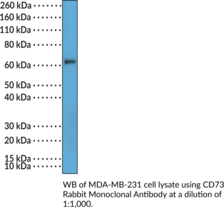Territorial Availability: Available through Bertin Technologies only in France
- Correlated keywords
- CD-73 glycosyl phosphatidyl inositol proinflammatory TGF? TNF? IL1? PGE-2 CD-39
- Product Overview:
CD73, also known as ecto-5′-nucleotidase, is a membrane-bound ectoenzyme that catalyzes the hydrolysis of AMP to adenosine, a mediator of purinergic signaling pathways.{63385,63386} It exists as a homodimer where each monomer is composed of a catalytic N-terminal domain, a C-terminal substrate-binding domain, and a glycosylphosphatidylinositol (GPI) anchor that is attached to the cell membrane.{63385} CD73 is ubiquitously expressed, and a soluble form of CD73 (sCD73) can be produced by proteolytic cleavage of its GPI anchor.{63385} It is upregulated by hypoxia and a variety of pro-inflammatory mediators, including TGF-?, IFN, TNF-?, IL-1?, and prostaglandin E2 (PGE2).{63387} The enzymatic activity of CD73 is coupled to CD39, the enzyme that produces AMP from ATP, a danger signal produced from injured or dying cells.{63386} CD73 converts AMP to adenosine, a ligand for adenosine receptors, which regulate various physiological responses, including inflammatory pathways.{63386,63387} It has other immunoregulatory functions, including acting as a T cell co-stimulatory molecule, inhibiting macrophage-mediated inflammation, and facilitating lymphocyte tethering to the endothelium.{63386} CD73 has additional roles in the maintenance of tissue barrier function, cardioprotection during ischemia-reperfusion injury, and cancer, where it promotes metastasis, angiogenesis, and immune evasion.{63388} Increased tumor CD73 expression is associated with poor overall survival in patients with breast or ovarian cancer.{63389} Cayman’s Ecto-5′-nucleotidase/CD73 Rabbit Monoclonal Antibody can be used for immunohistochemistry (IHC) and Western blot (WB) applications.
Cayman Chemical’s mission is to help make research possible by supplying scientists worldwide with the basic research tools necessary for advancing human and animal health. Our utmost commitment to healthcare researchers is to offer the highest quality products with an affordable pricing policy.
Our scientists are experts in the synthesis, purification, and characterization of biochemicals ranging from small drug-like heterocycles to complex biolipids, fatty acids, and many others. We are also highly skilled in all aspects of assay and antibody development, protein expression, crystallization, and structure determination.
Over the past thirty years, Cayman developed a deep knowledge base in lipid biochemistry, including research involving the arachidonic acid cascade, inositol phosphates, and cannabinoids. This knowledge enabled the production of reagents of exceptional quality for cancer, oxidative injury, epigenetics, neuroscience, inflammation, metabolism, and many additional lines of research.
Our organic and analytical chemists specialize in the rapid development of manufacturing processes and analytical methods to carry out clinical and commercial GMP-API production. Pre-clinical drug discovery efforts are currently underway in the areas of bone restoration and repair, muscular dystrophy, oncology, and inflammation. A separate group of Ph.D.-level scientists are dedicated to offering Hit-to-Lead Discovery and Profiling Services for epigenetic targets. Our knowledgeable chemists can be contracted to perform complete sample analysis for analytes measured by the majority of our assays. We also offer a wide range of analytical services using LC-MS/MS, HPLC, GC, and many other techniques.
Accreditations
ISO/IEC 17025:2005
ISO Guide 34:2009
Cayman is a leader in the field of emerging drugs of abuse, providing high-purity Schedule I-V Controlled Substances to federally-licensed laboratories and qualified academic research institutions for forensic analyses. We are certified by ACLASS Accreditation Services with dual accreditation to ISO/IEC 17025:2005 and ISO Guide 34:2009.





